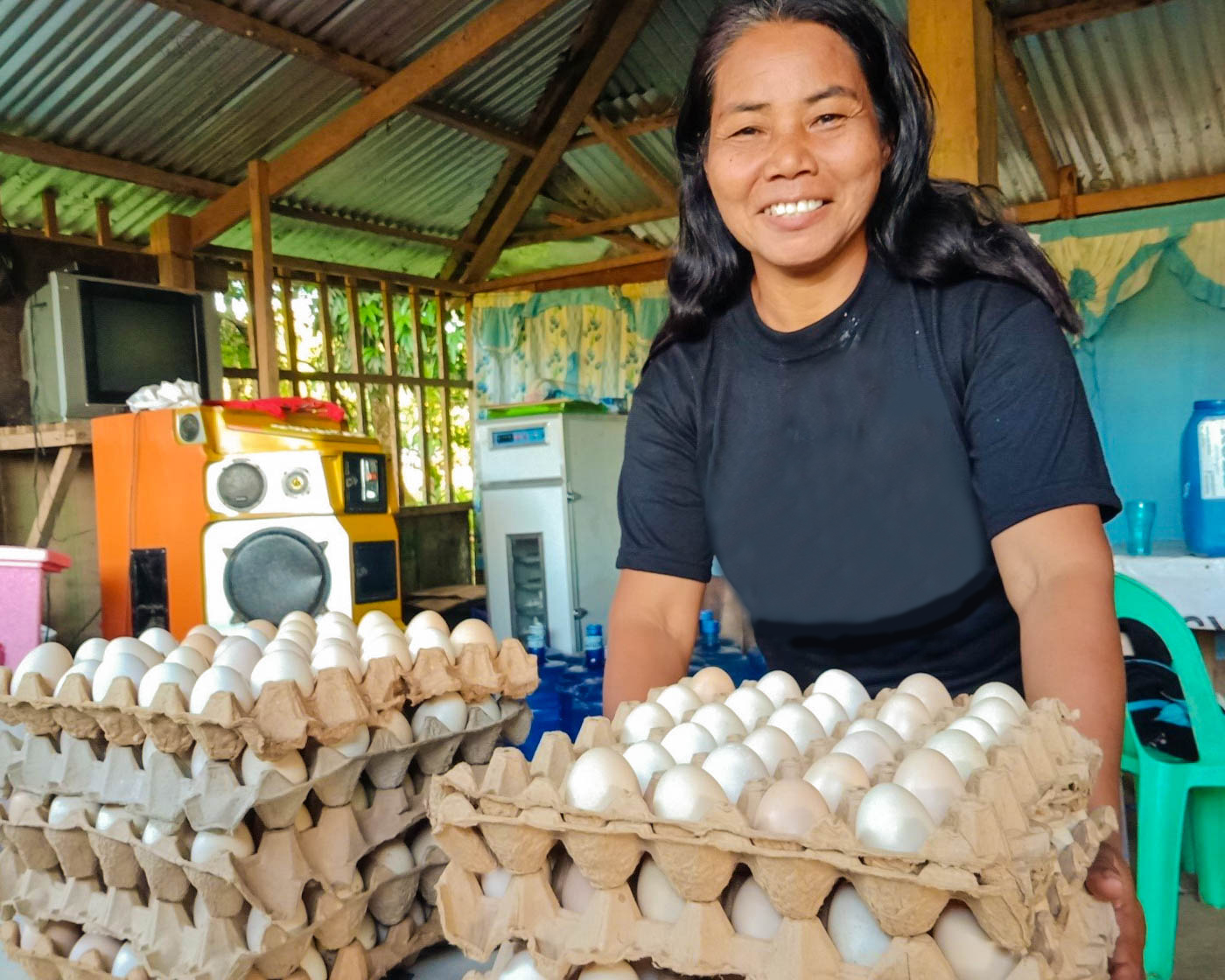The United Nations Women Organization asserts that when more women work, economies grow. While this claim is broad and excessively forward, this is altogether true. Included in the rooster challenging the gender gaps in the world is Nenita Dalayan, a farmer-entrepreneur in Bayabas, Surigao del Sur.
Nenita, 51 years old, leads the Balete Chicken Growers’ Association (BACGA), a farmers’ group engaging in the Chicken Production Project (worth Php 833,136.00) funded through the Department of Agriculture’s Special Area for Agricultural Development (SAAD) Program.
Starting an association of already preoccupied farmers became Nenita’s early challenge. While agricultural inputs are easily provided to the group, encouraging her 25 members’ full involvement took her some time.
“Initially, my members are less committed, busy with their existing livelihood. It took me some time, primarily convincing them, before they understood that this project will serve as an additional source of income for all of us,” shared Nenita.
Members’ commitment, once a hurdle for Nenita, is now a thing of the past. BACGA, in terms of egg production, is thriving. From April to July 2020, their sales from eggs alone amounted to Php 19,580.00. While it is unfair to credit BACGA’s performance to Nenita alone, we definitely can learn a thing or two from her.
Here are five management strategies Nenita and her members employ routinely:
- Delegate tasks. Farming, the major livelihood in the area, is laborious but manageable. Considering her members’ personal endeavors, as well as her full-time job as a barangay health worker, dividing the workload among her members was Nenita’s top priority.
“When the native chickens arrived, we grouped ourselves into 5 groups. At least one group is assigned every day. Some members guard the site in the morning while the remainder spend the night in the hut we constructed on the site. All groups are free to devise their strategies for as long as the site is guarded at all times,” Nenita added.
- Keep an inclusive recording system. Nenita, even without prior experience in project management, is well aware of how transparency builds and guarantees trust. BACGA started selling eggs for Php 210.00/tray in May 2020. With the money growing, they came up with a recording system and adopted a Physical and Financial Report from the SAAD Area Coordinator.
“All our income and expenses are recorded. We have developed a recording sheet for our sales, with details including the name of the buyer, the quantity sold, and the amount paid. Area Coordinator Rosemyr Bulatin also provided us a form that sums up our finances in a month. We never miss filling out those forms because they are important,” Nenita shared.
- Carry out immediate solutions. In sustaining any project, there’s no room for delayed actions. Being the group leader, Nenita consolidates her members’ concerns and presents the issues to them during their monthly meeting.
“I am a health worker and my job is demanding. But I know how much my members need me. We hold a monthly meeting every last Sunday of the month. As soon as we congregate, we address the problems all together,” Nenita said.
- Seek community support. Livelihood programs, while directly impacting the beneficiary-farmers, need as much community support there is. According to Nenita, they can’t afford to depend on supplies from the SAAD Program all the time. Good thing that their community is more than willing to support.
“Our community, especially our barangay captain, is overjoyed with the poultry in the locality. His administration contributed some materials for the construction of our mini hut and comfort room. While SAAD has provided us more than what we have imagined, there is a lot to put up in the site, such as a comfort room. We solicited from our community, and the rest we financed with our funds,” Nenita shared.
- Be innovative. Aside from producing eggs, BACGA aims to supply chickens to local buyers and food establishments in Bayabas. They already have prospect buyers to which they will deliver chicks and live chickens once available.
“All our earnings as of August 2020 came from selling eggs. Upon the arrival of the incubator from SAAD we readily started incubating 210 eggs. Sure, eggs are marketable, but if we want to progress financially we need to start investing in chick production,” said Nenita.
As found, women’s involvement in leadership roles often results in stronger social commitment and more participation among members. Consistent with other three associations in Bayabas all chaired by women, Area Coordinator Rosemyr Bulatin observed that “female leaders share and address even the minutest details and concerns.” Nenita, in particular, is “understanding, which is a strong quality for a president.”
By 2022, Nenita and members will be established agripreneurs. But for now, Nenita and her members are taking their time establishing a reputable name in the poultry industry. “We’re taking things slowly. Soon enough, we’ll get there.”
—
SAAD is a locally-funded program of the Department of Agriculture (DA) intended to help alleviate poverty among the marginalized sectors of agriculture and fishery in the country. Since 2019, DA Caraga has started providing SAAD projects in Agusan del Sur and Surigao del Sur.
Writer: Mark Angelo Pineda, Information Officer-SAAD Region 13


Comments (0)